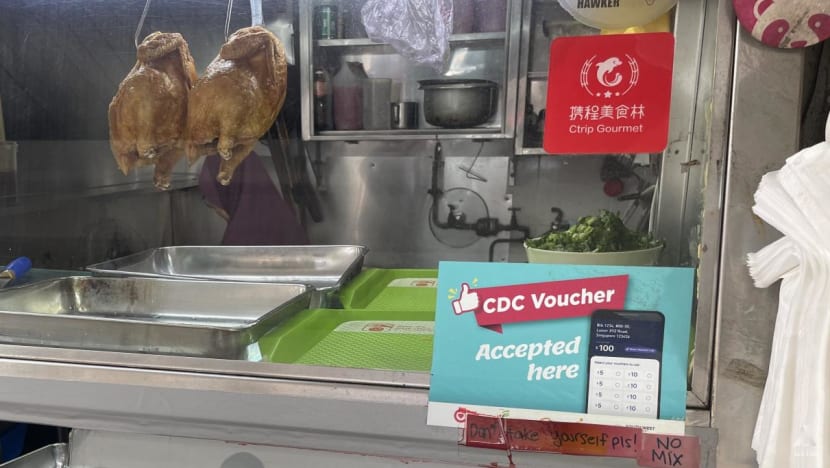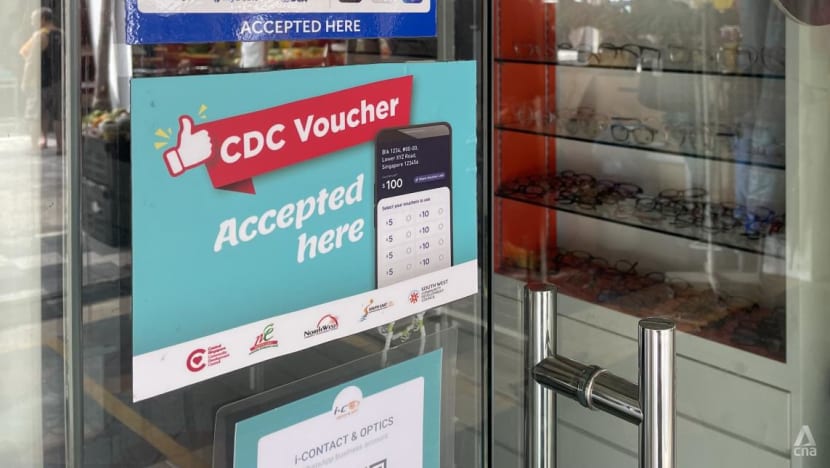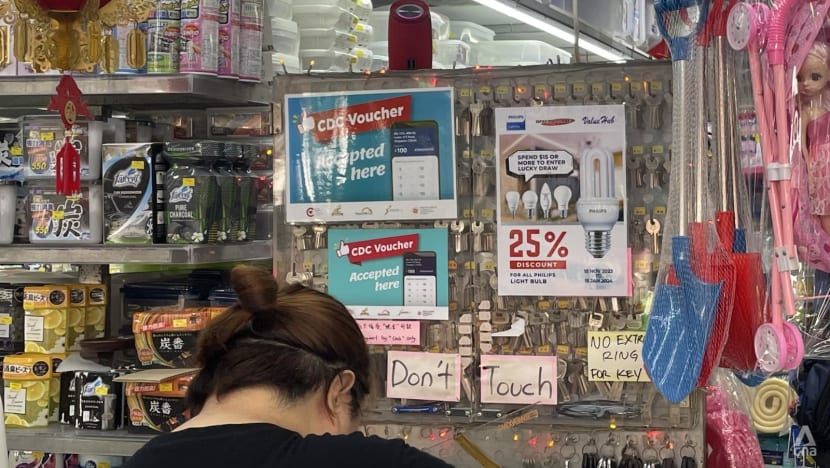Despite some misbehaving customers, Singapore’s heartland shops warm to CDC vouchers as scheme enters 5th year
Merchants and hawkers tell CNA the cash has generally helped their business, with some patrons spending more on things like hair perms and even mobile phones.

A sticker on a hawker stall showing that it accepts Community Development Council (CDC) vouchers. (Photo: CNA/Louisa Tang)

This audio is generated by an AI tool.
SINGAPORE: Despite some customers misusing their Community Development Council (CDC) vouchers, most heartland merchants and hawkers have embraced the scheme as a boost to their business in recent years.
The latest batch of the cash coupons was launched on Wednesday (Jan 3), with households in Singapore each receiving S$500.
The CDC scheme was first launched in June 2020 at the height of the COVID-19 pandemic, to help cope with the cost of living and support local businesses.
The vouchers can be spent at participating heartland merchants and hawkers, as well as certain supermarkets like NTUC FairPrice and Giant.
When they were first introduced, Madam Seet Kwee Man, who runs a traditional Chinese medicine stall in Clementi, often found herself trusting her customers when they handed over vouchers.
But when she checked on the transactions later, many of the vouchers were invalid or had already been redeemed - and she said she could do nothing about it because the customers had left her stall long ago.
“A lot of people in this hawker centre faced the same issues, because we’re very busy and we can’t keep checking or waiting for the transaction to go through. Customers will be waiting,” she said.
“If I insist on waiting for the transaction to go through, the customer might not be happy and the interaction might become antagonistic.”
Mdm Seet eventually chose to opt out of the CDC voucher scheme after the very first round in 2020.
“There are benefits to participating because people will come and buy things (with) the vouchers," the 73-year-old said. "But it’s not so easy for us older folks who run a stall by themselves.”
For Mr N Ranjen, who runs a spice and dried goods stall at the same Clementi food centre, it was a case of customers constantly demanding change in cash that pushed him to stop accepting CDC vouchers.
The 67-year-old said that after recounting such incidents to a government officer who was onboarding merchants to the scheme, he was advised to opt out since he was at risk of being cheated.
“Sometimes they pay for something that’s S$0.50 with a S$1 voucher, and ask for S$0.50 back. How can?” said Mr Ranjen.
Ms Yani Azman, a seafood hawker at New Upper Changi Road, has faced similar issues with invalid vouchers and customers asking for change in cash.
But she said these episodes haven't really affected business as only 5 to 10 per cent of her customers have used CDC vouchers.
In response to CNA's queries, a spokesperson from the Federation of Merchants' Associations Singapore said heartland shops see a "gradual increase" in voucher use after the Chinese New Year period.
Heartland merchants also gnerally take in 5 to 10 per cent more in revenue on average, due to extra liquidity from the vouchers, she said.
"The increase in revenue is also usually more significant during the initial months after the launch of the CDC vouchers scheme. This increase in revenue will help some businesses mitigate the rising business costs," added the spokesperson.
"However, there could be expectations for the government to sustain or increase the CDC voucher value in subsequent years."

"ONE-OFF" OR LONGER-TERM HELP?
The previous tranche of CDC vouchers was released in January last year, with each Singaporean household getting S$300 in vouchers.
Before that, vouchers were released in June 2020; February and December 2021; and May 2022.
Other merchants told CNA they have observed a marked increase in customers using the CDC vouchers, especially at the start and end of each validity period.
Mr Tee Chan Yong, who runs a mobile phone and accessories store in Clementi, saw a steady flow of customers in December, all hoping to finish their 2023 tranche of vouchers before they expired.
“There were a lot of uncles and aunties who came and said they wanted to buy a new phone or phone case because they had vouchers to use up,” he said.
“Of course it’s a good thing that people are coming to spend money, it helps with the cashflow.”

Ms Juliana Low, who works at a minimart along New Upper Changi Road, also pointed to an influx of customers on the last day of 2023. “It’s better for us, more people come in,” she said.
Hairstylist Linda Ling said the CDC vouchers encouraged regular customers of her salon in Bedok to opt for more expensive services such as a herbal hair dye.
With Chinese New Year festivities coming up, she fully expects them to use the latest round of CDC vouchers at her salon.
“Last time, some aunties couldn’t bear to perm their hair,” she told CNA in Mandarin. “Now, they have vouchers to do it."

The impact of CDC vouchers on heartland merchants will depend on both consumer behaviour and whether these shops sell goods that the consumers want, said veteran economist Song Seng Wun.
It might be a "one-off" that households use their vouchers at neighbourhood provision stores, while they continue to do most of their grocery shopping at larger places like supermarkets, said the economic advisor at CGS-CIMB Securities Singapore.
Mr Song also noted that with younger consumers not exactly flocking to neighbourhood shops, these merchants must stay digitally savvy and “dare to create that demand because the landscape is changing”.
“There is that push to get more merchants on the scheme," he added. "Whether it helps or not really ultimately depends on those who are spending the vouchers."

















